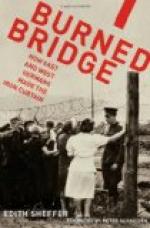But in Thompson these calmly recounted horrors worked profound distress. His imagination became immediately shot with sinister pictures. All these things which he had read and doubted, which had left him unmoved, now took on a terrible reality. He could see these things about which the returned soldier spoke, and seeing them believed. Believing, there rose within him a protest that choked him with its force as he sat in the cockpit beside this veteran of Flanders.
The man had fallen silent, staring into the green depths overside. Thompson sat silent beside him. But there was in Thompson none of the other’s passivity. Unlike the returned soldier, who had seen blood and death until he was surfeited with it, until he wanted nothing but peace and quietness, and a chance to rest his shrapnel-torn body and shell-shocked nerves, Thompson quivered with a swift, hot desire to kill and destroy, to inflict vengeance. He burned for reprisal. For a passionate moment he felt as if he could rend with his bare hands a man or men who could wantonly mutilate women and children. He could find no fit name for such deeds.
And, responding so surely to that unexpected stimulus, he had no stomach for crossing the Inlet as Tommy’s guest, to view the scene of Tommy’s industrial triumph-to-be. He wasn’t interested in that now.
Sitting under the awning, brooding over these things, he remembered how Sophie Carr had reacted to the story of the Belgian refugee that afternoon a year and a half ago. He understood at last. He divined how Sophie felt that day. And he had blandly discounted those things. He had gone about his individual concerns insulated against any call to right wrongs, to fight oppression, to abolish that terror which loomed over Europe—and which might very well lay its sinister hand on America, if the Germans were capable of these things, and if the German’s military power prevailed over France and England. When he envisaged Canada as another Belgium his teeth came together with a little click.
He clambered out of the Alert’s cockpit to the float.
“Tell Mr. Ashe I changed my mind about going over with him,” he said abruptly, and walked off the float, up the sloping bank to the street, got in his car and drove away.
As he drove he felt that he had failed to keep faith with something or other. He felt bewildered. Those little children, shorn of their hands—so that they could never lift a sword against Germany—cried aloud to him. They held up their bloody stumps for him to see.
CHAPTER XXV
—AND THE BOMB THE FUSE FIRED
It took Thompson approximately forty-eight hours to arrange his affairs. He managed things with a precipitancy that would have shocked a sound, practical business man, for he put out no anchors to windward nor troubled himself about the future. He paid his bills, transferred the Summit agency to his head salesman—who had amassed sufficient capital to purchase the stock of cars and parts at cost. Thus, having deliberately sacrificed a number of sound assets for the sake of being free of them without delay, Thompson found himself upon the morning of the third day without a tie to bind him to Vancouver, and a cash balance of twenty thousand dollars to his credit in the bank.




